译林英语选修8 Unit 2 The universal language Grammar and usage课件(共22张PPT)
文档属性
| 名称 | 译林英语选修8 Unit 2 The universal language Grammar and usage课件(共22张PPT) |
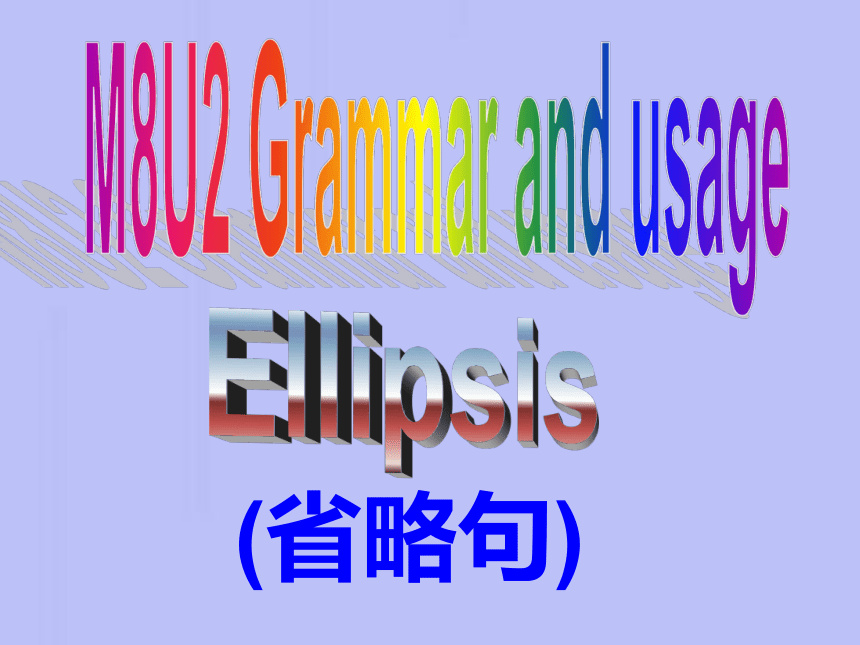
|
|
| 格式 | zip | ||
| 文件大小 | 300.8KB | ||
| 资源类型 | 教案 | ||
| 版本资源 | 牛津译林版 | ||
| 科目 | 英语 | ||
| 更新时间 | 2020-05-06 00:00:00 | ||
图片预览

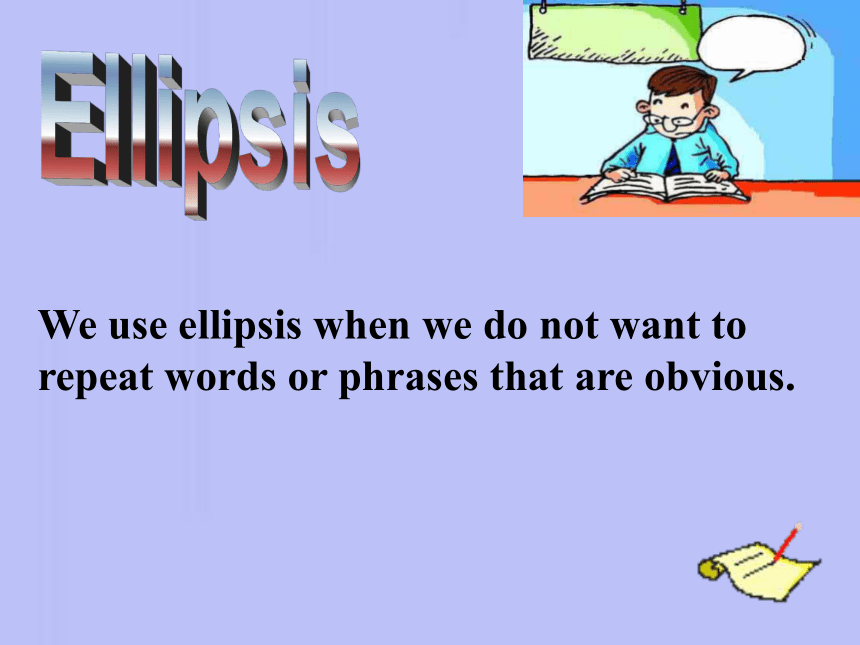
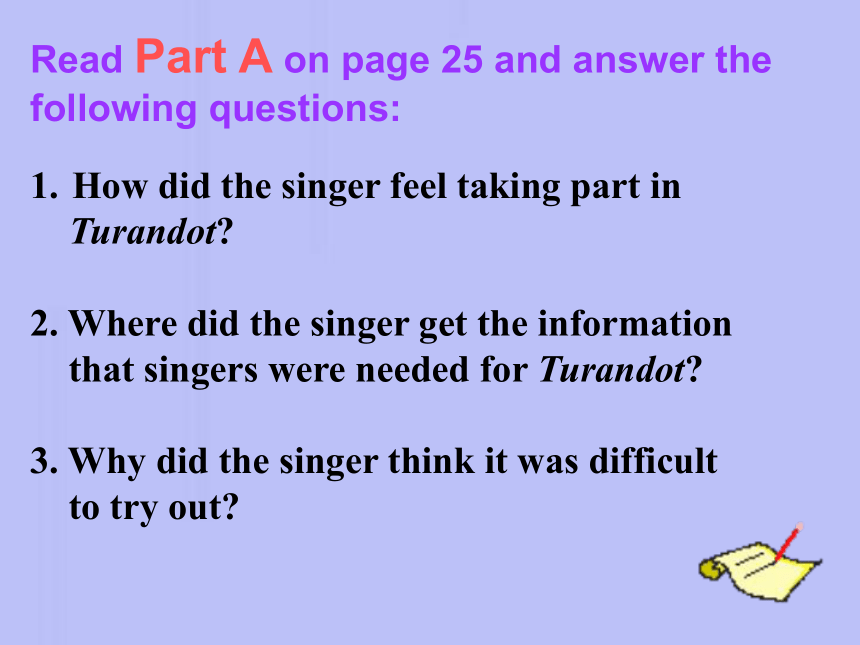
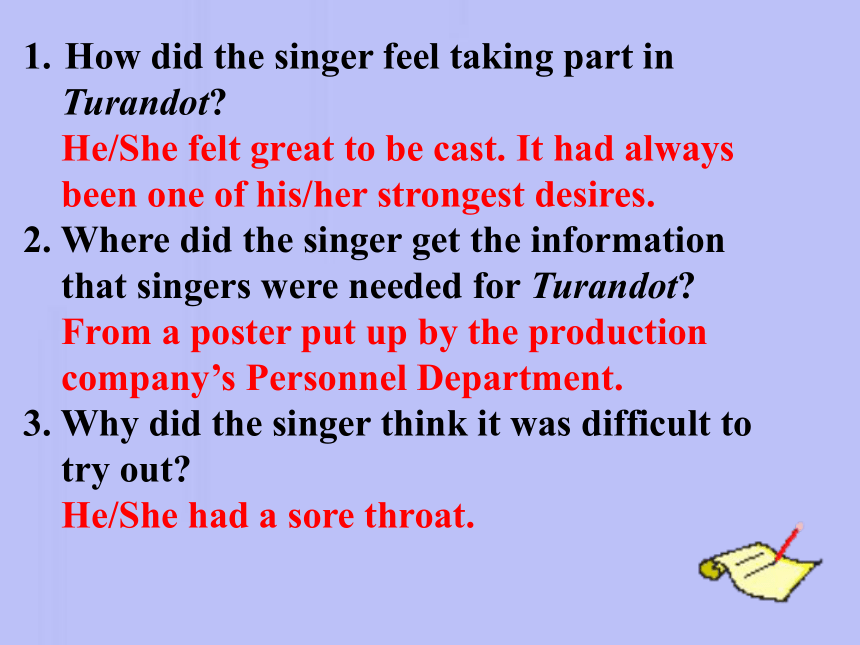


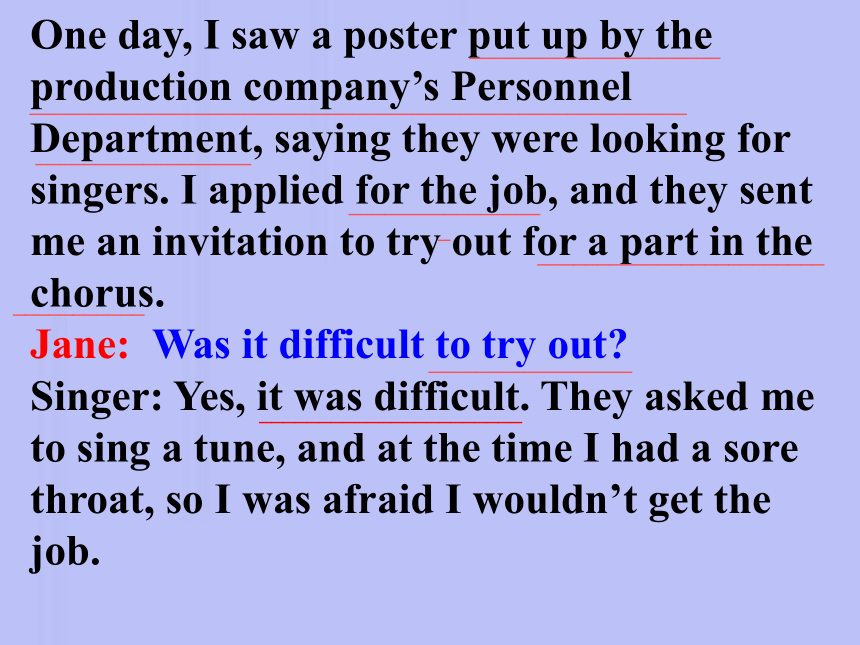
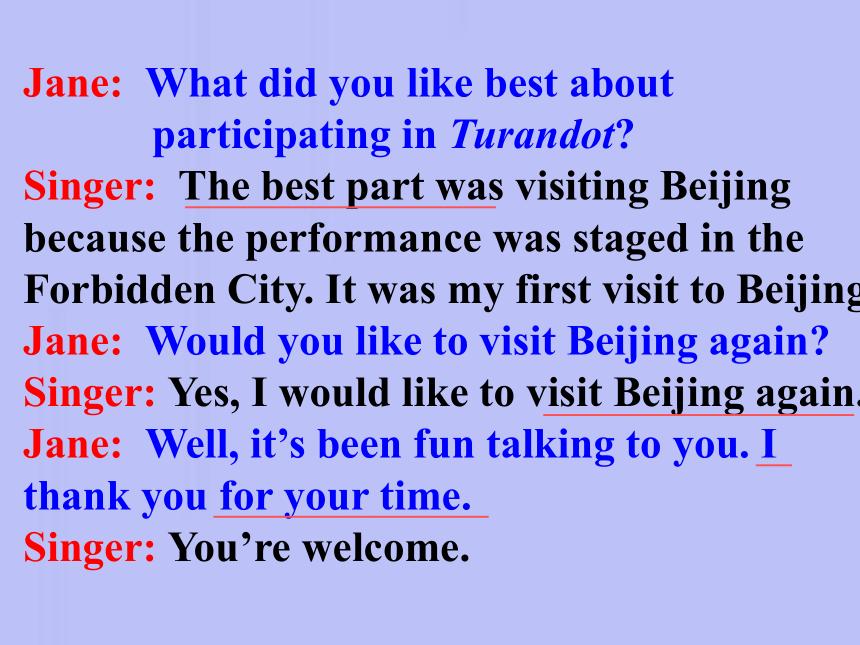

文档简介
(共22张PPT)
M8U2 Grammar and usage
Ellipsis
(省略句)
Ellipsis
We use ellipsis when we do not want to repeat words or phrases that are obvious.
Read Part A on page 25 and answer the following questions:
How did the singer feel taking part in
Turandot?
2. Where did the singer get the information
that singers were needed for Turandot?
3. Why did the singer think it was difficult
to try out?
How did the singer feel taking part in
Turandot?
He/She felt great to be cast. It had always
been one of his/her strongest desires.
2. Where did the singer get the information
that singers were needed for Turandot?
From a poster put up by the production
company’s Personnel Department.
3. Why did the singer think it was difficult to
try out?
He/She had a sore throat.
Underline the words you could cross out and read again and you will find that the language would be more concise(简练的).
Part A
Jane: How did you feel taking part in Turandot?
Singer: It was a real opportunity for me to be cast. It had always been one of my strongest desires to have a part in Turandot.
Jane: How were you hired for the job?
Singer: Well, I’m a musical performer, but there was a short period when I was not working, and was just collecting unemployment benefits.
______________
__________
________________________________________
___________________
One day, I saw a poster put up by the production company’s Personnel Department, saying they were looking for singers. I applied for the job, and they sent me an invitation to try out for a part in the chorus.
Jane: Was it difficult to try out?
Singer: Yes, it was difficult. They asked me to sing a tune, and at the time I had a sore throat, so I was afraid I wouldn’t get the job.
_____________________
_______________________________________________________
__________________
___________
________________________
_________________
______________________
_________________
Jane: What did you like best about
participating in Turandot?
Singer: The best part was visiting Beijing because the performance was staged in the Forbidden City. It was my first visit to Beijing.
Jane: Would you like to visit Beijing again?
Singer: Yes, I would like to visit Beijing again.
Jane: Well, it’s been fun talking to you. I thank you for your time.
Singer: You’re welcome.
__________________________
__________________________
_______________________
___
Useful expressions
1. 被雇佣做这项工作
be hired/employed for the job
2. 音乐表演者
a musical performer
perform a play/an operation/a function
/a task
put on /give a performance
3. 领取失业津贴
collect unemployment benefits
4. 张贴海报
put up a poster
表演/履/执行/完成任务
演出
5. 申请这份工作
apply for the job
6. 嗓子疼
have a sore throat
7. 参加Turandot的表演
participate in /take part in Turandot
8. 跟你交谈很有趣。
It’s been fun talking to you.
★ 常见的省略句式(1-6见课本P24第1点)
1. 祈使句中省主语;
2. 简略回答中省去助动词后的部分;
3. 动词不定式短语中省去to后的部分;
4. 非正式英语中省去某些词;
5. 某些介词或连词后(如: if, when, than);
6. 两个使用相同句型和相同动词的分句中;
7. 冠词的省略
(详见Notes)
7. 冠词的省略
(1) She sings (the) best in the class.
(在副词的最高级前面的the常可以省略 )
(2) Our teacher came in, book in hand.
=Our teacher came in, with a book in his
hand.
(在某些独立主格结构中)
(3) Child as he is, he knows a lot.
=Although he is a child, he knows a lot.
(在as引导的让步状语从句中,当作表语
的单数名词提前时,不定冠词要省略 )
(4) ①Obama was elected president of America in
2008, wasn’t he?
(表示最高职位或独一无二的头衔的名词前
不要冠词)
②This?is?professor?Brock?bank,?head?of?the?
history?department.?
(当一个名词用作表语或同位语表示一个领导
职位时, 前面常不加冠词)
③The young worker has turned writer.
She has turned a successful singer.
(turn后接表示职业的单数可数名词作表语时,
名词前一般不用冠词; 但若该名词前有形容词
修饰时, 则需要加冠词)
Notes: (关于不定式的省略)
1. 常用不带to的不定式结构:
*had better do sth.
*would rather do sth.
*cannot (help) but do sth.
=do nothing but do sth.
=have nothing to do but do
(=have to do sth.)
*Why not do sth.?
*We have nothing to do now but wait.?????
=We have no choice but to wait.
2. 不定式符号to一般不省, 但在一些习惯用
法中, 可以保留to, 也可以不要to
(1)---Do you live here?
---No, but I________(曾经).
(2)---Would you mind looking after my cat?
---Not at all. I’d________________(乐意).
(3)She wanted to play football, but her
mother told her__________(不要踢足球).
(4)If you_________________(想要), I would
like to treat you to tea this evening.
(5)You shouldn’t come in unless
__________(被要求).
used to
be happy/willing to
not to
wish/want/like (to)
asked (to)
(6) He will never go abroad even if he
_________________(有机会).
(7) I haven’t read the book, but I wish I
would _____________(有时间).
(8) Although he would like
___________________ (食言/不信守承诺),
the emperor cannot break his promise.
has a chance (to)
have time (to)
to (break his promise)
3. 如果不定式结构中是be或have(助动词),
需保留be或have
----Are you a taxi driver?
----No, but I__________.
John didn’t come, but he____________.
4. 并列不定式中后者的to常省略
Our homework is to copy the new words and_____________.
used to be
ought to have
recite the text
但,
?I came not to scold but to praise you.
我来不是责备你,而是赞美你。
5. 主语部分有实意动词do 的任何形式,
is /was后是不定式做的表语解释do 的内
容, 通常省略to.
The only thing you have to do is ___________________ (摁按钮).
(to) press the button
Part B
★ 在一些特殊文体中,单词被省去以节省空间或书写时间(课本P24 第2点):
1. 标志牌和标签
2. 报纸标题
3. 指示语
4. 明信片/日记
5. 笔记
Part B
Answers
1 b 2 c 3 a 4 d 5 e
1. Bob James, a pop star, dies of drug
abuse.
2. This is the door to the stage.
3. The performance last night was not as
good as expected.
4. Please handle this with care.
5. Turandot was really a wonderful
performance, and the setting was fantastic
too.
_______________________
__________
____________
_______________
_________
_____
______
_________
_____
______________
__________
___
Keys to Practice:
1-5: DACBC
6-10: ACCAB
11-15: ABBDB
16-20: BCBBA
21-25: BDCBC
Thank you!
M8U2 Grammar and usage
Ellipsis
(省略句)
Ellipsis
We use ellipsis when we do not want to repeat words or phrases that are obvious.
Read Part A on page 25 and answer the following questions:
How did the singer feel taking part in
Turandot?
2. Where did the singer get the information
that singers were needed for Turandot?
3. Why did the singer think it was difficult
to try out?
How did the singer feel taking part in
Turandot?
He/She felt great to be cast. It had always
been one of his/her strongest desires.
2. Where did the singer get the information
that singers were needed for Turandot?
From a poster put up by the production
company’s Personnel Department.
3. Why did the singer think it was difficult to
try out?
He/She had a sore throat.
Underline the words you could cross out and read again and you will find that the language would be more concise(简练的).
Part A
Jane: How did you feel taking part in Turandot?
Singer: It was a real opportunity for me to be cast. It had always been one of my strongest desires to have a part in Turandot.
Jane: How were you hired for the job?
Singer: Well, I’m a musical performer, but there was a short period when I was not working, and was just collecting unemployment benefits.
______________
__________
________________________________________
___________________
One day, I saw a poster put up by the production company’s Personnel Department, saying they were looking for singers. I applied for the job, and they sent me an invitation to try out for a part in the chorus.
Jane: Was it difficult to try out?
Singer: Yes, it was difficult. They asked me to sing a tune, and at the time I had a sore throat, so I was afraid I wouldn’t get the job.
_____________________
_______________________________________________________
__________________
___________
________________________
_________________
______________________
_________________
Jane: What did you like best about
participating in Turandot?
Singer: The best part was visiting Beijing because the performance was staged in the Forbidden City. It was my first visit to Beijing.
Jane: Would you like to visit Beijing again?
Singer: Yes, I would like to visit Beijing again.
Jane: Well, it’s been fun talking to you. I thank you for your time.
Singer: You’re welcome.
__________________________
__________________________
_______________________
___
Useful expressions
1. 被雇佣做这项工作
be hired/employed for the job
2. 音乐表演者
a musical performer
perform a play/an operation/a function
/a task
put on /give a performance
3. 领取失业津贴
collect unemployment benefits
4. 张贴海报
put up a poster
表演/履/执行/完成任务
演出
5. 申请这份工作
apply for the job
6. 嗓子疼
have a sore throat
7. 参加Turandot的表演
participate in /take part in Turandot
8. 跟你交谈很有趣。
It’s been fun talking to you.
★ 常见的省略句式(1-6见课本P24第1点)
1. 祈使句中省主语;
2. 简略回答中省去助动词后的部分;
3. 动词不定式短语中省去to后的部分;
4. 非正式英语中省去某些词;
5. 某些介词或连词后(如: if, when, than);
6. 两个使用相同句型和相同动词的分句中;
7. 冠词的省略
(详见Notes)
7. 冠词的省略
(1) She sings (the) best in the class.
(在副词的最高级前面的the常可以省略 )
(2) Our teacher came in, book in hand.
=Our teacher came in, with a book in his
hand.
(在某些独立主格结构中)
(3) Child as he is, he knows a lot.
=Although he is a child, he knows a lot.
(在as引导的让步状语从句中,当作表语
的单数名词提前时,不定冠词要省略 )
(4) ①Obama was elected president of America in
2008, wasn’t he?
(表示最高职位或独一无二的头衔的名词前
不要冠词)
②This?is?professor?Brock?bank,?head?of?the?
history?department.?
(当一个名词用作表语或同位语表示一个领导
职位时, 前面常不加冠词)
③The young worker has turned writer.
She has turned a successful singer.
(turn后接表示职业的单数可数名词作表语时,
名词前一般不用冠词; 但若该名词前有形容词
修饰时, 则需要加冠词)
Notes: (关于不定式的省略)
1. 常用不带to的不定式结构:
*had better do sth.
*would rather do sth.
*cannot (help) but do sth.
=do nothing but do sth.
=have nothing to do but do
(=have to do sth.)
*Why not do sth.?
*We have nothing to do now but wait.?????
=We have no choice but to wait.
2. 不定式符号to一般不省, 但在一些习惯用
法中, 可以保留to, 也可以不要to
(1)---Do you live here?
---No, but I________(曾经).
(2)---Would you mind looking after my cat?
---Not at all. I’d________________(乐意).
(3)She wanted to play football, but her
mother told her__________(不要踢足球).
(4)If you_________________(想要), I would
like to treat you to tea this evening.
(5)You shouldn’t come in unless
__________(被要求).
used to
be happy/willing to
not to
wish/want/like (to)
asked (to)
(6) He will never go abroad even if he
_________________(有机会).
(7) I haven’t read the book, but I wish I
would _____________(有时间).
(8) Although he would like
___________________ (食言/不信守承诺),
the emperor cannot break his promise.
has a chance (to)
have time (to)
to (break his promise)
3. 如果不定式结构中是be或have(助动词),
需保留be或have
----Are you a taxi driver?
----No, but I__________.
John didn’t come, but he____________.
4. 并列不定式中后者的to常省略
Our homework is to copy the new words and_____________.
used to be
ought to have
recite the text
但,
?I came not to scold but to praise you.
我来不是责备你,而是赞美你。
5. 主语部分有实意动词do 的任何形式,
is /was后是不定式做的表语解释do 的内
容, 通常省略to.
The only thing you have to do is ___________________ (摁按钮).
(to) press the button
Part B
★ 在一些特殊文体中,单词被省去以节省空间或书写时间(课本P24 第2点):
1. 标志牌和标签
2. 报纸标题
3. 指示语
4. 明信片/日记
5. 笔记
Part B
Answers
1 b 2 c 3 a 4 d 5 e
1. Bob James, a pop star, dies of drug
abuse.
2. This is the door to the stage.
3. The performance last night was not as
good as expected.
4. Please handle this with care.
5. Turandot was really a wonderful
performance, and the setting was fantastic
too.
_______________________
__________
____________
_______________
_________
_____
______
_________
_____
______________
__________
___
Keys to Practice:
1-5: DACBC
6-10: ACCAB
11-15: ABBDB
16-20: BCBBA
21-25: BDCBC
Thank you!
